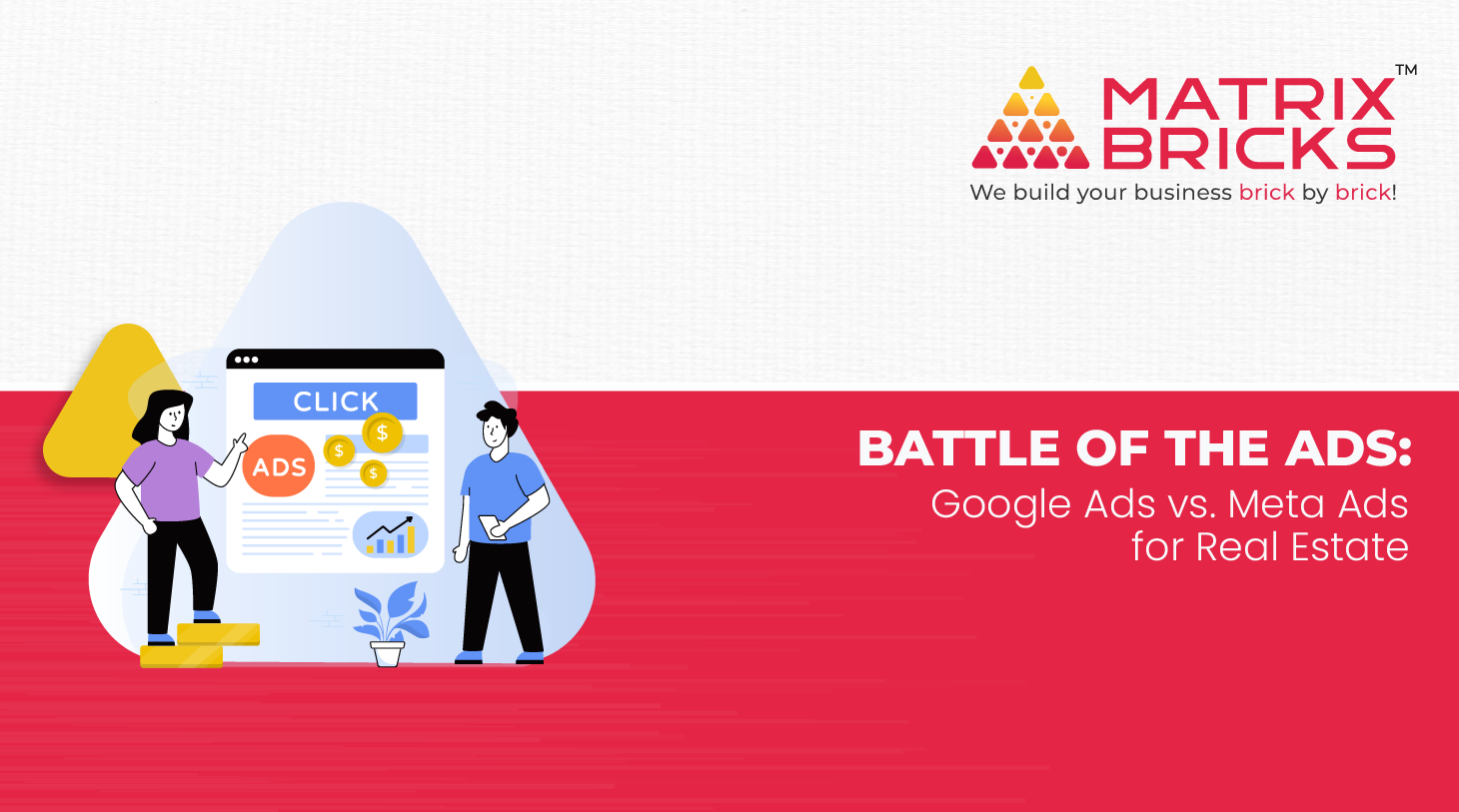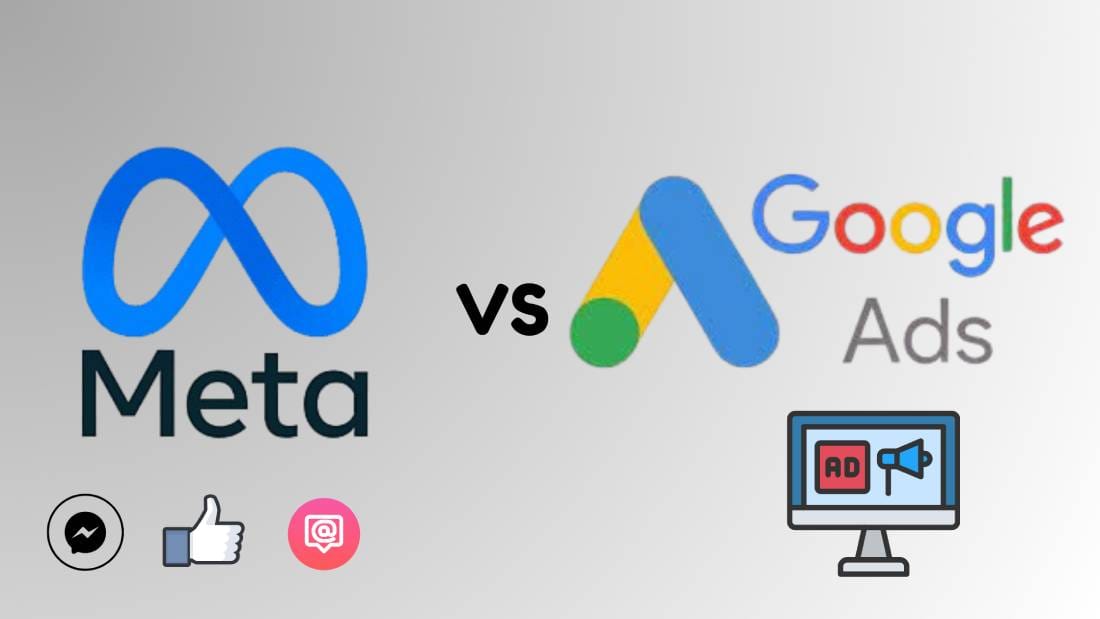
The extremely competitive real estate world, where acquiring and retaining clients can be what makes or breaks a business, relies heavily on well-designed advertising strategies. With the digital domain at the helm, a real estate agency is at a crossroads: must they embark on Google Ads for Real Estate or utilise Meta Ads (formerly Facebook Ads) to boost their campaign? In this blog, the two advertising giants are compared, and how they can be implemented in real estate is discussed.

1. The Power of Search vs. Social
Prior to making a comparison, it is important to know what kind of nature both platforms hold. Google Ads is an intent-based marketing platform. This implies that when a user searches for real estate terms, they are already showing interest in the market. Google captures this intent through keywords and uses it to target specific audiences that are actively looking for real estate solutions.
On the other hand, Meta Ads will enable you to target audiences based on their interests, demographics, behaviours, and more. Such a type of advertising is under the social media marketing banner and is very effective for creating brand awareness and engaging potential clients who may not be actively searching for real estate but could be interested in your services or listings.
2. Targeting Capabilities: Precision vs. Broad Reach
Targeting capabilities are one of the main ways that Google Ads and Meta Ads differ from one another. For example, Google Ads’ keywords will offer precise targeting. To put it another way, a real estate company can configure its advertisements to only show up when a customer types “buy house in Manchester” or “luxury property for sale London.” For agencies who target individuals who are near decision-making and already a little further down the sales funnel, this is really beneficial.
Meta Ads present an opportunity to reach larger audiences by enabling advertisers to reach out to users based on age, interest, and their online behavior. This becomes perfect for real estate firms in terms of reaching users who are at the top of the funnel since if there are people interested in the designing of houses or home renovations, then they will easily see real estate advertising when they come up for a newly constructed house or property.
3. Budget Efficiency and ROI
In terms of budget, each of Google Ads and Meta Ads has its own kind of value. Google Ads for real estate are often more expensive per click because real estate is a very competitive market. With that said, higher costs could translate to a higher conversion rate since you are dealing with users who have a high intent to buy or rent. The way to maximise the ROI is to use relevant high-traffic keywords and optimise the landing page for the best user experience and conversion rates.
Meta Ads are less expensive to operate in terms of cost per impression and click. They provide a way to access a lot of people with just a minimal budget, hence suitable for awareness campaigns that nurture leads over time. Therefore, real estate businesses building a brand or promoting an event, such as an open house, can greatly benefit from Meta Ads due to being very cost-efficient.
4. Ad Format Variety and Engagement
Google Ads and Meta Ads deliver different types of ad formats, each as follows:
Google Ads come in the forms of text ads, display ads, and video ads on YouTube. These are especially powerful in targeting active users looking for particular properties or services in real estate. Display ads, however, can be used to retarget people who have engaged with your website but did not convert so that your agency remains at the top of your mind.
Numerous ad styles are available from Meta Ads, including dynamic ads, slideshow ads, video ads, and carousel ads. Carousel ads can work well to present multiple properties through a single ad, while the video ads help in creating some engaging content that would throw light on property tours, neighbourhood features, and client testimonials. All these interactive formats tend to yield higher engagement rates as well as more opportunities to interact with your brand on the part of potential leads.

5. The Role of a Digital Marketing Agency for Real Estate
Choosing between Google Ads and Meta Ads can be very complicated, especially for agencies that don’t have in-house expertise in managing campaigns effectively. Here is where a digital marketing agency for real estate will make all the difference. A specialised agency can guide you through the process of setting up and managing both types of ads, making sure that your campaigns are optimised for the best performance.
A real estate digital marketing agency can carry out deep market research about the most effective keywords of Google Ads. It is possible to develop creative ad copy for Meta Ads that aligns with your brand and appeals to the target demographic. It would track and analyse performance metrics to create data-driven decisions that enhance the ROI. Design landing pages and lead capture forms in a way that converts the traffic into actual leads.
6. Combining both strategies to optimum effect
The best strategy for most real estate agencies is not to choose between Google Ads and Meta Ads but rather to use them in a complementary manner. For instance, use Google Ads to target users who are actively searching for properties or real estate services while using Meta Ads to build brand awareness and remain at the top of the mind among those who are not yet actively searching.
This multi-channel approach helps ensure that your agency is visible across different stages of the customer’s journey. A balanced real estate online marketing strategy with search and social advertising maximises your potential reach and leads generation opportunities.
Conclusion
The choice between Google Ads and Meta Ads largely depends on your objectives, budget, and target audience. For high-intent, conversion-focused campaigns, Google Ads can be highly effective. For building brand awareness and nurturing long-term relationships, Meta Ads are a powerful tool. To get the most out of your advertising efforts, consider partnering with a digital marketing agency for real estate that can craft a custom strategy tailored to your goals and help you navigate the complexities of both platforms.
In an industry as dynamic as real estate, staying ahead of the competition means understanding and leveraging the right advertising strategies. Whether you opt for one platform or both, the key is to adapt, test, and optimise your campaigns to stay relevant in the ever-evolving market.






